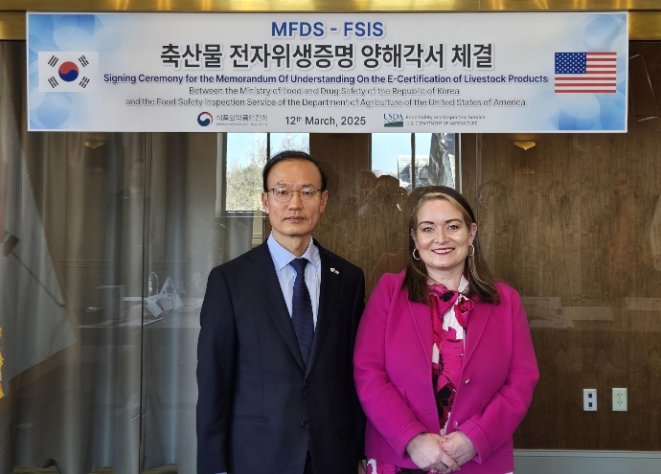
The
Ministry of Food and Drug Safety (MFDS) has signed a Memorandum of
Understanding (MOU) with the U.S. Food Safety and Inspection Service (FSIS) to
digitize sanitary certificates for American livestock products imported into
South Korea. The agreement, finalized on March 13 in Washington D.C., marks a
significant advancement in streamlining the import process and strengthening
food safety management between the two nations.
This
collaboration is the result of extensive working-level discussions between MFDS
and FSIS since last year, aimed at ensuring a secure and efficient exchange of
sanitary certification data. As early as the end of this year, South Korea is
expected to implement an electronic sanitary certification system, becoming the
first country in the world to receive digital sanitary certification
information for livestock products from the United States.
The
initiative holds particular importance given that U.S. livestock products
constitute the largest share—approximately 31%—of South Korea’s total meat
imports. With the adoption of electronic sanitary certification, South Korea
will join Australia, Chile, Thailand, Brazil, and New Zealand in utilizing this
system. Once in place, an estimated 68% of the country’s imported livestock
products will be processed through digital certification.
The
transition to electronic certification is expected to deliver multiple
benefits. By eliminating the risk of certificate forgery and falsification, the
system will enhance the safety management of imported and exported livestock
products. Furthermore, digitalization will remove the need for issuing,
verifying, and storing paper documents, improving inspection efficiency and
reducing costs. The reduction of paper usage also aligns with global carbon
neutrality goals, reinforcing sustainability efforts.
MFDS
has reaffirmed its commitment to strengthening international cooperation to
expand the use of electronic sanitary certification for imported livestock and
seafood products. This initiative is part of a broader strategy to accelerate
the digital transformation of imported food safety management, ensuring a more
efficient, secure, and sustainable regulatory framework.








